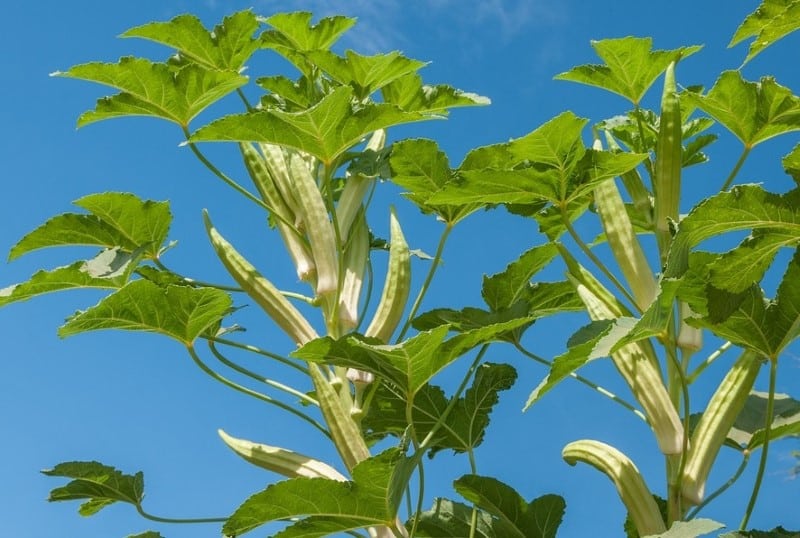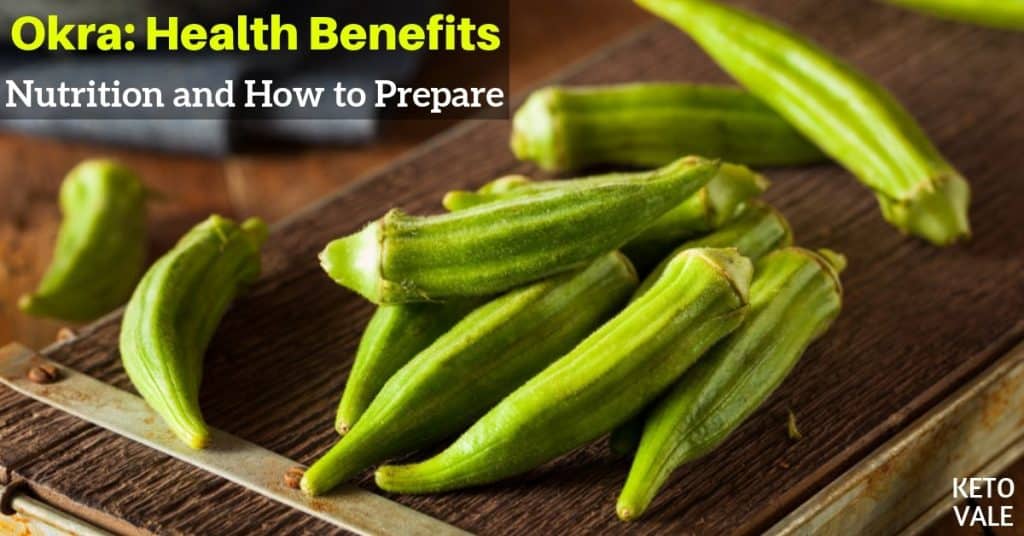Most people don’t associate vegetables with being a large part of the ketogenic diet. And while this might be true, it’s still important to make sure you’re eating plenty of non-starchy veggies even if you’re on keto.
This is because vegetables are high in vitamins, minerals, fiber, and antioxidants that you probably aren’t getting a lot of from high-fat foods. Balancing your keto meals is the key to preventing deficiencies.
Luckily, there are plenty of ways to incorporate more low-carb veggies into your ketogenic grocery list.
Okra is a great example of a low-carb veggie that goes well with just about anything you serve it with. We’ve broken down the health benefits of okra and how to incorporate it into your ketogenic diet to enhance your fiber and nutrient intake without getting kicked out of ketosis.
What is Okra?
Okra has one of those names you won’t likely forget after you hear it. But because it’s not as popular as spinach or broccoli, it goes unnoticed in the grocery aisle most of the time.

Contrary to popular belief, okra (or Hibiscus esculentus if you want to get really technical and call it by its scientific name) is not a legume. It’s a flowering plant that belongs to the Malvaceae family.
It goes by many names, including Lady’s finger, Bamya, and Bhindi, and it can be eaten cooked, raw, fried, or however you most enjoy your vegetables (1).
The plant was originally founded in West Africa or even parts of Southeast Asia and India due to the warm climate. Today, it can even be found in the United States (2).
Research shows that the plant is grown for its long, finger-like fruits, which are harvested and then its seeds are used in food supplements (3).
You can find okra in the grocery store in fresh or canned form.
Nutrition of Okra
Here is the nutritional breakdown of okra per a 100 gram serving (4):
- 33 calories
- 0.19 grams of fat (remember, it’s a vegetable- most of them don’t have much fat)
- 1.93 grams of protein
- 7.45 grams of carbs (about 4 grams net carbs)
- 3.2 grams of fiber
- 89.58 grams of water
- 82 mg of calcium
- 0.62 mg of iron
- 57 mg of magnesium
- 61 mg of phosphorus
- 299 mg of potassium
- 7 grams of sodium
- 0.58 grams of zinc
- 23 mg of vitamin C
- 60 mg of folate
- 716 mg of vitamin A
- 31 mg of vitamin K
- Trace amounts of B vitamins
As you can see, its low-carb profile makes okra an ideal vegetable to add to your ketogenic diet. It’s full of vitamins and minerals, which makes it great for keeping deficiencies away. Plus, it has a high water content so you stay hydrated.
Not to mention, it’s a good source of electrolytes to help you out of the keto flu.
Finally, okra contains phytonutrients and antioxidants that you need to stay healthy while in ketosis by combating free radical damage and reducing inflammation.
Is Okra Keto Friendly?
Yes, okra is keto-friendly. It’s low in carbohydrates and can be included in a ketogenic diet, providing fiber and nutrients while keeping carb intake minimal.
You can eat okra on keto diet by simply boiling and serve with as a side with meat. You can also do low-carb chicken or beef stirfry with okra.
Is boiled okra keto friendly?
Yes, boiled okra is keto-friendly. It remains low in carbohydrates when boiled, making it suitable for a ketogenic diet while providing beneficial fiber and nutrients.
How many carbs does okra have?
Okra contains about 7 grams of carbohydrates per 100 grams, with roughly 3 grams of that being dietary fiber. This makes the net carbs in okra approximately 4 grams per 100 grams, making it a relatively low-carb vegetable.
Related: Electrolytes and Supplements Guide for Keto Diet
Top Scientific Health Benefits of Okra: What Is Okra Good For?
If you were to go searching for okra in the grocery store, you might not find it at first. It’s a green vegetable that looks like a cross between a cucumber and a green bean.
Because of its green color, you can bet that okra contains a good amount of chlorophyll, which is the pigment that gives green vegetables their color. Chlorophyll has been shown to contain anti-inflammatory properties that can be used to prevent or treat chronic diseases (5).
Here are some other health benefits of okra:
#1. Contains Anti-fatigue Properties
Sure, you can turn to caffeine to get you through the day, but too much can dehydrate you. Okra can give you a boost when you need a little energy. Adding it to your diet several times a week can help propel you through your long days.
Research shows that okra contains anti-fatigue properties, thanks to its antioxidant flavonoid and polyphenol content (6).
Antioxidants help boost your energy by combatting free radical damage that makes you feel sluggish. In other words, they bind to toxins that accumulate in the body and neutralize them so that they no longer accumulate in your tissues or organs and disrupt important processes by causing inflammation.
If you want to get all technical about it, then here you go. Research shows that okra’s mechanisms of anti-fatigue action include reducing the levels of blood lactic acid and urea nitrogen, increasing superoxide dismutase and glutathione peroxidase levels, enhancing hepatic glycogen storage and promoting antioxidant capabilities by lowering malondialdehyde levels (7).
#2. Protects the Liver
Research shows that okra contains hepatoprotective activity, which helps keep your liver healthy.
One study found that okra prevented liver injury in rats by decreasing the elevation of serum cholesterol, triglycerides, malondialdehyde non-protein sulfhydryls and total protein levels in the liver tissue. The study credited okra’s hepatoprotective properties to its high antioxidant profile (8).
#3. Contains a Lot of Fiber
Okra’s fiber content alone is enough of a health benefit to eat it, especially if you’re on the ketogenic diet and don’t get enough fiber in your diet as it is.
Research shows that okra can be used to treat digestive ailments, thanks to its high fiber and mucilage content (9).
One study found that the mucilage properties in okra helped protect against a Helicobacter infection, thanks to the antiadhesive activity of mucilage in the intestines. If left untreated, this can lead to gastric ulcers (10).
Fiber has lots of health benefits that it doesn’t always get credit for. For example, the high amount of fiber in okra can also be used to keep your blood sugar levels stable as fiber helps slow down assimilation of glucose in the intestines. It also helps keep you feeling full for longer so you eat fewer calories and lose weight as a result.
Finally, fiber improves the overall health of your gut bacteria, which houses almost your entire immune system and controls the production and secretions of several neurotransmitters, such as GABA, serotonin, and dopamine. This means that eating a diet high in fiber can have a positive effect on your mood.
Related: A List of Low-Carb, High-Fiber Foods for Keto
#4. Promotes a Healthy Pregnancy
Ladies, don’t wait until you’re pregnant to start preparing your body for a healthy pregnancy. You can start now by incorporating more okra into your diet.
Research shows that the high levels of folate in okra can help prevent birth defects and congenital heart defects (11).
#5. Prevents Dementia and Alzheimer’s Disease
Research shows that okra can help protect the brain by reducing the risk of Alzheimer’s disease and other neurodegenerative diseases that are related to oxidative stress (12).
Once again, this is because of the high antioxidant content found in okra.
#6. Reduces Inflammation
Inflammation is often blamed as the underlying cause of most diseases. That’s because it creates a harsh environment in your body where diseases are free to thrive.
Okra’s antioxidant and flavonoid profile can help reduce inflammation by fighting free radicals to prevent chronic diseases from occurring in the first place (13).
#7. Keeps Your Heart Health
Plenty of studies link plant constitutes (such as the ones found in okra) to better heart function. For example, one study found that flavonoid intake was linked to a lower risk of cardiovascular disease (14).
Okra contains lots of those, so you’re covered there. Another study found that okra seeds helped reduce LDL cholesterol levels, which is the “bad” kind that contributes to the risk of heart disease and stroke by blocking blood flow in your arteries (15).
#8. Stabilizes Blood Sugar Levels
Not that you need any help with blood sugar if you’re on the ketogenic diet, but a little something extra never hurts.
Research shows that okra seeds and peels contain antidiabetic and antihyperlipidemic properties (16).
This comes in handy when trying to fight off a type 2 diabetes diagnosis. When you combine the ketogenic diet with low-carb vegetables like okra, you’re doing your blood sugar levels a solid.
#9. Supports Bone Health
Okra is a surprisingly good source of plant-based calcium, which is always good because plants contain other healing nutrients like antioxidants and flavonoids.
The high levels of calcium in okra can help you improve bone mineral density, especially when coupled with vitamin D, which you can find in lots of ketogenic foods like egg yolks (17).
#10. Boosts Immunity and Promotes Skin Health
Antioxidants are best known for boosting the immune system. But in addition to keeping you healthy throughout the flu season, the antioxidants in okra can help improve your vision and even keep your skin healthy.
This is because antioxidants heal the body from the inside out. They even protect against overexposure to the sun, which contributes to skin aging and wrinkles.

Where To Buy Okra
You might be surprised by this, but you can buy okra at almost any major grocery store, especially Asian grocery stores. It’s one of those vegetables that you don’t notice unless you’re looking for it, so chances are you’ve seen it before and completely missed it.
If your local grocery store doesn’t carry okra, then you might need to go to a health or specialty store. Your best bet to finding okra at your local supermarket is during May through September when the plant is in season.
There are several varieties of okra, so keep this in mind when looking for it. Some grow tall, and some are short. Some are purple, and some are green. You want to buy okra with a brightly colored skin that hasn’t been tainted or blemished.
Feel around for firmness as this means the okra is ripe and ready to eat. You can also look for canned okra in the canned foods section, but keep in mind that fresh is always best.
How To Cook Okra
Cooking okra seems tricky because it contains seeds. But don’t let this deter you from treating it like any other vegetable. We recommend slicing some okra up into bite-sized pieces and cooking them in olive or coconut oil. You can also drizzle them in olive oil and bake them in the oven for a nice crunch or fry them up with ghee, sea salt, and pepper.
Some people steam them or add them to soups. Because it’s so hydrating, we like to eat okra alongside drier cuts of meat to enhance the flavor and moisture. Toss some okra in your salads or add them to stir-fries. Keep in mind that poorly cooked okra tends to turn out slimy due to the water content, so you’ll want to make sure it’s thoroughly cooked before eating.
Should You Add Okra into Your Keto Meals?
Contrary to popular belief, okra is not a legume. It’s a low-carb, non-starchy vegetable, which makes it safe to eat on the ketogenic diet. Adding okra to your ketogenic menu is a great way to balance your meals and make sure you’re not running low on any vitamins or minerals.
Okra is high in several key nutrients, including fiber, flavonoids, and antioxidants, which aren’t always readily available in high-fat foods. We recommend adding okra to your low-carb vegetable rotation to keep your digestive system healthy and blood sugar levels down.
Okra can be hard to find in the store because most people don’t know what it looks like. We think it looks like a cross between a cucumber and green beans. Look for a long, green plant with seeds in the middle (although you won’t be able to see the seeds because they are enclosed).
Because of its high water content, you’ll want to make sure you cook okra all the way through to prevent it from becoming slimy. Fry some in coconut oil or ghee or toss it in olive oil and bake it in the oven for a nice side-dish along your favorite meat-based dish.
Conclusion
Okra is low-carb and has numerous health benefits that you might be lacking in your low-carb diet. This makes it an excellent vegetable to add to your ketogenic lineup.
It contains an excellent source of antioxidants to combat free radical damage, which can help boost immunity, support bone and heart health, and stabilize blood sugar levels.
Okra has also been shown to improve skin health, aid in a healthy brain, support pregnancy and liver health, and increase digestive health.
Okra can be found in most grocery stores but you have to know what you’re looking for! You can buy canned okra. However, fresh is always best.
Prepare it however you would prepare your favorite vegetables. It tastes great alongside a meat dish after being cooked in olive or coconut oil.
Enjoy this post? Save it for later reference!








